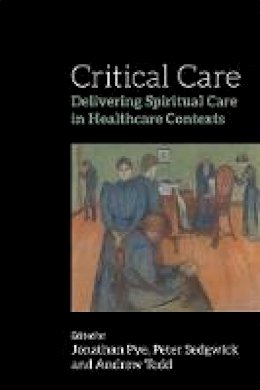
Stock image for illustration purposes only - book cover, edition or condition may vary.
Critical Care: Delivering Spiritual Care in Healthcare Contexts
Jonathan Pye
€ 39.93
FREE Delivery in Ireland
Description for Critical Care: Delivering Spiritual Care in Healthcare Contexts
Paperback. A collection of essays focusing on spiritual care within the delivery and provision of healthcare today. The contributors combine academic and professional expertise to discuss themes including: spirituality, pluralism and multi-faith practice, healthcare ethics, legal and policy issues, mental health, and beginning and end of life issues. Editor(s): Todd, Andrew; Pye, Jonathan; Sedgwick, Peter. Num Pages: 280 pages. BIC Classification: HRLP5; MBP. Category: (P) Professional & Vocational. Dimension: 155 x 230 x 16. Weight in Grams: 408.
Providing a bridge between research in healthcare and spirituality and practitioner perspectives, these essays on chaplaincy in healthcare continue dialogue around constructing, negotiating and researching spiritual care and discuss the critical issues in chaplaincy work, including assisted suicide and care in children's hospices. Each section of the book is introduced by an academic theologian, giving the book a strong theoretical base, before serving healthcare chaplains offer their perspectives and experiences with material drawn from practice in a broad spectrum of healthcare contexts. The integration of theory and practical application in these essays will be of interest to chaplains, healthcare practitioners, and students of theology and healthcare.
Product Details
Publisher
Jessica Kingsley Publishers
Format
Paperback
Publication date
2015
Condition
New
Weight
409g
Number of Pages
280
Place of Publication
London, United Kingdom
ISBN
9781849054973
SKU
V9781849054973
Shipping Time
Usually ships in 5 to 9 working days
Ref
99-1
About Jonathan Pye
Steve Nolan, Ph.D., is a palliative care chaplain at Princess Alice Hospice, Surrey, UK, where he works daily with people who are dying, supporting them and their families. He regularly teaches spiritual care to students visiting the hospice and is a tutor on the MTh in Chaplaincy Studies at St. Michael's College, Llandaff, part of Cardiff University.
Reviews for Critical Care: Delivering Spiritual Care in Healthcare Contexts
For those involved in providing spiritual care within the NHS in the UK, this is an invaluable book - clear, well written and structured, and with impeccable bibliography and further resources to aid study.
Ministry Today UK Though we live in a secular time, we are still confronted with questions about meaning and purpose, particularly when we become ill or are confronted with a terminal condition. Spiritual care tries to support patients, carers and staff to find an answer to such questions in a dialogical and compassionate way. This book presents excellent contributions to spiritual care from a multi-disciplinary perspective and will certainly help to develop spiritual care as a professional practice. This is very much needed in view of the economisation of health care and the marginalization of the care for the spiritual needs of patients and their carers.
Ruud ter Meulen, Professor of Ethics in Medicine, University of Bristol, UK This is one of the most comprehensive and practical books on healthcare chaplaincy I've read. Like the act of chaplaincy itself, it takes the reader to a place of deep questioning and embodies the theology it espouses: relational, panentheistic, apophatic and humble. Its value reaches far beyond the healthcare context into what spirituality can offer the public square more generally. Highly recommended.
Claire Foster-Gilbert, Director, Westminster Abbey Institute The development of meaning and practice in spiritual and pastoral care in hospital chaplaincy has applications both to the healthcare system and beyond. This book makes a great contribution to that development. Three eminent thinkers in this area provide the context and connections, and several practitioners provide the reflection on practice - bridging the gaps between theory, values and practice; theological reflection and reflective practice; and spirituality and the practice of healthcare. Don't just view this book as relevant to the profession of hospital chaplaincy (significant though its contribution to that is), view it as a major contribution to the profession of care in any context.
Simon Robinson, FRSA, Professor of Applied and Professional Ethics, Leeds Beckett University
Ministry Today UK Though we live in a secular time, we are still confronted with questions about meaning and purpose, particularly when we become ill or are confronted with a terminal condition. Spiritual care tries to support patients, carers and staff to find an answer to such questions in a dialogical and compassionate way. This book presents excellent contributions to spiritual care from a multi-disciplinary perspective and will certainly help to develop spiritual care as a professional practice. This is very much needed in view of the economisation of health care and the marginalization of the care for the spiritual needs of patients and their carers.
Ruud ter Meulen, Professor of Ethics in Medicine, University of Bristol, UK This is one of the most comprehensive and practical books on healthcare chaplaincy I've read. Like the act of chaplaincy itself, it takes the reader to a place of deep questioning and embodies the theology it espouses: relational, panentheistic, apophatic and humble. Its value reaches far beyond the healthcare context into what spirituality can offer the public square more generally. Highly recommended.
Claire Foster-Gilbert, Director, Westminster Abbey Institute The development of meaning and practice in spiritual and pastoral care in hospital chaplaincy has applications both to the healthcare system and beyond. This book makes a great contribution to that development. Three eminent thinkers in this area provide the context and connections, and several practitioners provide the reflection on practice - bridging the gaps between theory, values and practice; theological reflection and reflective practice; and spirituality and the practice of healthcare. Don't just view this book as relevant to the profession of hospital chaplaincy (significant though its contribution to that is), view it as a major contribution to the profession of care in any context.
Simon Robinson, FRSA, Professor of Applied and Professional Ethics, Leeds Beckett University
